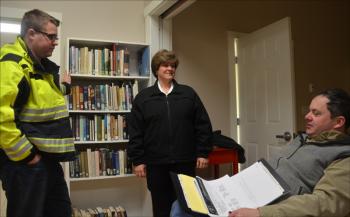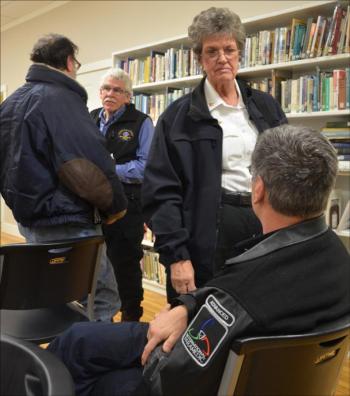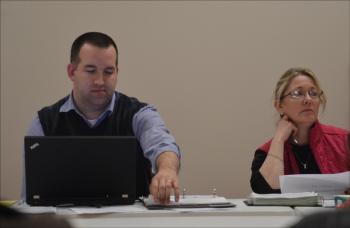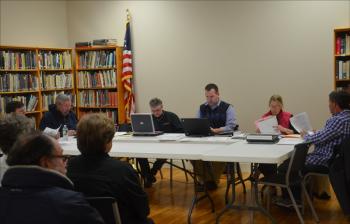Hope gives preliminary nod to Camden First Aid; talks continue with four towns
HOPE — As Hope selectmen carefully combed through the town's proposed 2013-2014 municipal budget, they found preliminary concensus March 12 with each other and Camden First Aid Association, agreeing to pay $5,000 to the ambulance service for coverage for this coming year. Camden First Aid agreed to that price, after a long and forthcoming discussion about the nonprofit's fiscal challenges.
• Camden First Aid seeking $407,000 in funding from four-town taxpayers
• Camden, Lincolnville, Rockport to circulate requests for emergency services proposals
At the same time, the selectmen also decided to join Camden, Lincolnville and Rockport in a joint circulation of a request for proposals from other ambulance services in the region. Currently, Camden Town Manager Pat Finnegan is developing an RFP for review of the four managers and administrators, who include Jon Duke of Hope; David Kinney of Lincolnville; and Roger Moody of Rockport. Moody is also researching options available in state statutes for possible alternative organizational structures for providing regional EMS services. Both Camden and Lincolnville hope to have an EMS provider decision by July 1.
Three Camden First Aid representatives — EMS Chief Julia Libby, Deputy EMS Chief Julie Allen and Scheduler Brian Allen — appeared before the regularly scheduled meeting of the Hope selectmen, as they were attempting to complete the budget in order to pass their recommendations along to the town's budget committee.
The financial issues confronting Camden First Aid are significant this year, and the four area towns that depend on ambulance service from the nonprofit have begun to grapple with proposed EMS cost increases at the same time that they are putting budgets together for their next fiscal year, which begins July 1.
Although the situation affects all four towns, and indirectly, some of the broader public safety services, there have been no four-town public community meetings scheduled to talk about the EMS situation.
Libby has met with the four towns now, either with selectmen or budget committees, coming away with varying responses. Camden's budget committee voted 17 to 2 to preliminarily budget $174,000 for this coming year for Camden First Aid service; likewise, Lincolnville did the same, budgeting $77,000. Rockport agreed to hold $64,000 aside, half of Camden First Aid's requested amount. All of the numbers remain preliminary, however, as Libby continues to negotiate for her organization and the towns conduct their own due diligence for taxpayers.
Camden's budget committee has also requested that Libby return to talk again about the finances on March 28.
Camden First Aid serves the four towns year-round and around the clock. The organization told the towns last year that it must raise its rates this year in order to remain solvent, meeting first with town managers to lay out the details of its dire fiscal situation.
On Feb. 27, town officials were officially told that Camden First Aid needed $407,000 this coming year to meet budget, up from the $56,000 requested collectively from the four towns last year.
The Camden-based nonprofit laid out its requests for this budget season, which would affect the four towns over fiscal year 2013-1014: seeking $174,000 from Camden, $129,000 from Rockport, $77,000 from Lincolnville and $27,000 from Hope.
For years, Camden First Aid received annual allocations from each of the four towns it serves, but those donations, funneled through the service provider lines in each of the towns' budgets, have only supplemented a small portion of the Camden First Aid budget.
On Tuesday however, Libby told Hope selectmen that she would be willing to drop Hope's portion of the request to $5,000.
"$5,000 this year and see what happens," she said. "I don't want to close any doors. I dont want to see 10 people out of work. We have been here for 80 years and we have a great reputation, at least for our care. I want to work with the towns. There must be some way to work together to keep this going. I am willing to do it. I have nothing to hide."
Hope, with its population of 1,671, is the only town of the four that splits its emergency medical service between two organizations, and does so geographically. All residents west of Payson Road are assisted by Union Ambulance, which is a municipally-run service. Every resident east of Alford Lake Road is serviced by Camden First Aid. This has been a working relationship since the late 1990s, and this year, Union is asking approximately $4,900. Last year, Union asked for $5,500 and received $3,661.
Until this year, and over past recent history, Camden First Aid has asked Hope for $2,000.
At Tuesday's meeting, Libby reflected on the past 18 months, during which Camden First Aid, incorporated in 1996, has undergone an leadership change and a board overhaul. When asked how the board of directors has changed, Libby said that until 2011, the board consisted of those who worked at Camden First Aid. That has since changed, and the new board consists of Kim Graffam, Vicki Eugley, Tom Jackson, Skip Day, Steve Corson (chairman), Julie Allen, Harvey Rudisaile, Ramona Graves, Chris Sewall and Neil Courtney and Libby.
"It's taken all of us more than a year and half to go through all the books to figure out all the numbers," she told the selectmen, who regularly gather for their meetings around a table in the town library.
"Last year we lost $92,000-plus," she said. "We have made cuts, got rid of some of the assets."
She referred to property Camden First Aid acquired in 2006 in the northern Aroostook County of St. Agatha. Former Camden First Aid Service Chief Chris Knight had purchased that one-acre lakefront property, assessed at $86,000, as a retreat for staff, said Libby.
"It's going up for auction this spring, so we can get rid of that," she said.
Libby described her vision of the full-service she wants the organization to provide. That includes maintaining four trucks, keeping two crews available during the day, and one crew at night, although she added she would like a back-up crew available during nighttime hours. She also wants to purchase a smaller vehicle, a van - and cheaper on fuel - to be used for transports. She anticipates that to cost $80,000, and it would serve to phase out one of the older ambulances. Those older units are 1997 and 2004 models, all due for replacement.
She also said she hoped to buy another larger ambulance for emergency parts.
Libby was asked if the service would suffer if it cut to three ambulances and fewer staff.
"Have we thought about it?" asked Libby. "Yes, we have. We can't do it."
There are times when three ambulances are out all at once, such as what happened earlier that very day, she said.
Libby hired three new fulltime staff members last year in order to maintain 24-hour paramedic coverage. There are now seven paramedics on staff, and because of their training, they are allowed to treat patients with chest pain or respiratory difficulties. They can intubate, give medications and pace a heart, she said, whereas those with less training cannot. She said in a conversation March 15 that the hospital had been pushing Camden First Aid for four or five years to have paramedics on call. In the past, the organization was expected to call Rockland for a paramedic, which costs Camden First Aid approximately $10,000 a year.
"The expectation is to have a paramedic on every call," she said. "They have not had a raise in four years and they have worked really hard to keep the organization going."
She said the organization is assisted by a skilled corps of volunteers, such as the technical high terrain rescue team and and those skilled with extrication/access equipment.
Libby was asked if the extrication/access service was redundant, to which she replied, "Camden and Rockport don't have any."
She said on March 15, however, that there are discussions under way now to divest of the access equipment, perhaps to Lincolnville. With that proposition, Camden Fire Department is now considering purchasing its own equipment, which Libby said, would be shared with Rockport.
At the meeting, Libby also mentioned that she has been asked why ambulance crews are spotted around Camden at Hannaford or Subway.
"Why don't we go in our private cars," she asked. "Because if a tone goes off, it [ambulance] is fully manned with a staff and ready to go. They are not riding around just joyriding. If they are driving around, it is for driver training. I go down to the post office and bank almost every day, so we have a full crew."
Budget
At the Hope meeting, Libby distributed Camden First Aid's 2013 budget, which totals $1,096,800 in expenses. Those expenses include a payroll for 10 staff of $477,500, with an additional $86,000 in payroll taxes and benefits. The budget has built in a 4 percent salary increase for staff.
Expenses also include $60,000 in principal loan payments for the building that Camden First Aid is housed in, on John Street, and another $45,400 in interest payments. The organization has approximately 18 more years to complete payments on its building, she told Hope selectmen.
The budget also builds in $100,000 for capital reserve.
Projected revenues include $850,000 in billed ambulance runs and $13,500 in donations.
Bad debt — those unpaid balances Camden First Aid is unable to collect from private patients, who are unable to pay — amounts to $25,000.
The organization has taken steps to collect bad debt; still, it writes off a certain amount every year.
Other complicating factors that the organization faces includes services it provides but cannot recoup on. That includes responding to nursing homes and retirement facilities for situations that can be as minor as helping people who fall down to get back on their feet.
"We can't bill for picking up," said Libby.
Nor can the service charge for a call that does not result in a transport to a medical facility.
The discussion touched briefly on those situations that are heavily regulated by laws, or policies, that border on the point of being ridiculous. Governed by rules that prohibit nurses in facilities from crossing from one designated section of assisted living quarters to another differentiated section, medically assessing distressed residents in independent apartments or moving patients back to nursing homes from hospital emergency rooms results in calls to ambulances. But those types of calls produce no revenue for Camden First Aid.
"Their issue shouldn't be the burden on you," said Hope Selectman Brian Powers, Jr.
Julie Allen, treasurer of Camden First Aid, told the selectmen that 60 percent of the organization's billing revenue derives from Medicare, "because we have an aging population."
Medicare has a fee schedule that is set according to the geographical area, and what ambulance services in that area charge.
"They don't set my fees but I am forced to be close to what everybody else is," she said.
Additionally, Medicare reimburses just 80 percent of the charge, and depending on the patient, it could be less.
"I may get 80 percent or 70 percent," she said.
Commercial insurance is better, she said, generally reimbursing 80 to 100 percent.
"But there is less and less commercial-insured," said Libby, referencing the current economy and the lack of insurance carried by a good portion of the population.
MaineCare, said Allen, allows a 50 percent reimbursement.
"The other 50 percent is written off," she said.
There are some patients who attempt to pay themselves for an ambulance call, which can range from $325, pus $9.50 a mile for gasm, to $750 paramedic run.
"Some people pay $5 or $2 a month, and there are those who can't pay at all,” she said.
“Kind of a wacky business to be in,” said one resident.
"Not realistic, is it," said Libby. "But it is an expected service. We could close down all the ambulances and what would the public do?"
She said she has the help of an accountant to work on a business plan.
“Our business is unique,” she said.
“Went from having no checks and balances and no outside board at all,” said Allen. “When the board of directors came on that's when all the checks and balances came on. An outside acounting firm came on with an outside audit. There have been lot of changes. That's what we've been doing for the last two years.”
"How did you get the numbers," asked Hope Town Administrator Jon Duke, specifying the method by which Camden First Aid decided to assess the individual towns their fees.
"As far as I know, we never had a formula," said Libby. "We had to come up with a formula. The easiest way was to come up with per capita charge."
Libby told the selectmen that Camden First Aid would be willing to change the structure of its governance from being a 501C3 nonprofit to a quasi-municipal organization, such as the Mid-Coast Solid Waste, an idea that has been discussed at previous meetings.
“People talk about Plan A and Plan B," said Libby. "I think we've gone by that and now we are on Plan C and D. I'm not unmindful of how difficult this is for the towns. I don't look at the towns as a bank. Everybody is having difficulty. I am sorry that it is a sticker shock. I really am.”
Libby was also asked why Camden First Aid's budget is higher than others, and what differentiates its service.
"It's the quality of equipment and care that we render," she said. "I have old ambulances but they are well maintained. We have jaws and a technical rescue team. You get what you pay for. Sometimes cheaper isn't better."
Selectman Tim Pearse also asked by Rockport had paid more for the ambulance service in the past than had Camden. Libby explained that the former service chief, Chris Knight, believed that because Camden First Aid paid no property taxes in Camden, because it is classified as a charitable nonprofit, that should offer something back to Camden in lieu of taxes.
Libby said that in order to increase revenue, she hopes to start charging for mutual aid calls, to "bill the service because we can't bill the patient. Rockland does that with Owls Head. They did that; $76,000 for 120 calls."
Libby said she has been in the business for 30 years and has seen a range of expectations from the public. Although calls have decreased by 500 since 2009, some people still call when they don't need to.
"Public education makes a difference," she said. "EMS has been given away. We've been treated like a red-headed stepchild. Police get paid, and fire departments have come a long way."
Editorial Director Lynda Clancy can be reached at lyndaclancy@penbaypilot.com; 706-6657.































